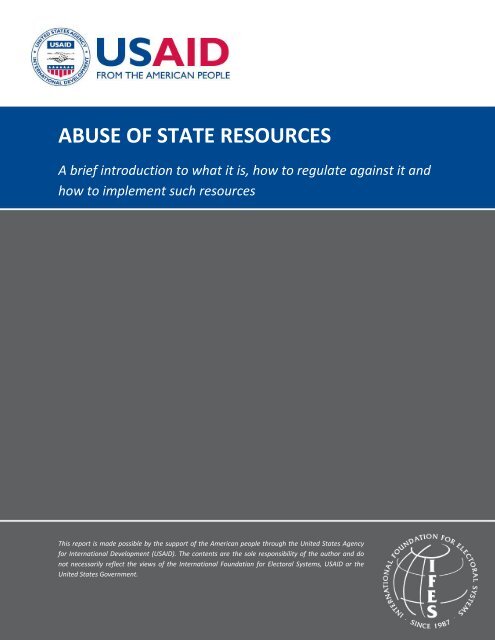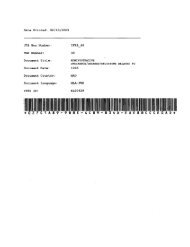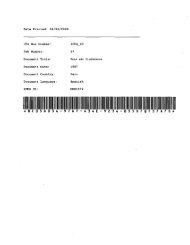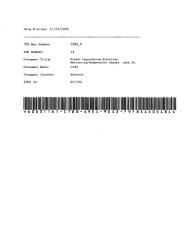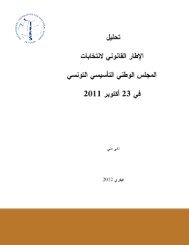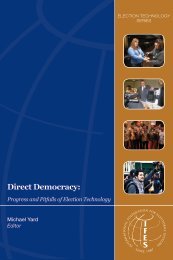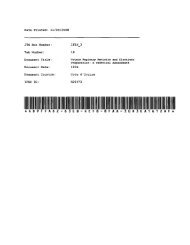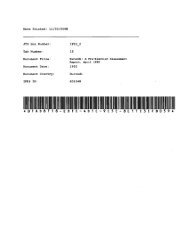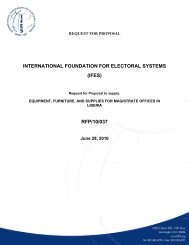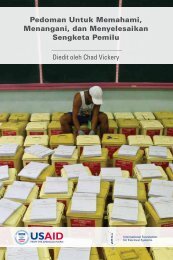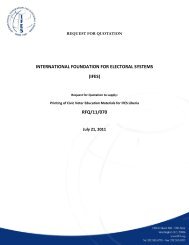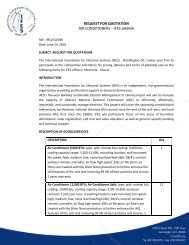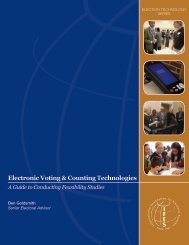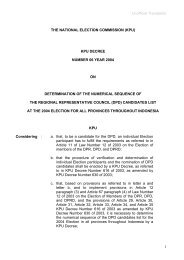ABUSE OF STATE RESOURCES - IFES
ABUSE OF STATE RESOURCES - IFES
ABUSE OF STATE RESOURCES - IFES
Create successful ePaper yourself
Turn your PDF publications into a flip-book with our unique Google optimized e-Paper software.
<strong>ABUSE</strong> <strong>OF</strong> <strong>STATE</strong> <strong>RESOURCES</strong><br />
A brief introduction to what it is, how to regulate against it and<br />
how to implement such resources<br />
This report is made possible by the support of the American people through the United States Agency<br />
for International Development (USAID). The contents are the sole responsibility of the author and do<br />
not necessarily reflect the views of the International Foundation for Electoral Systems, USAID or the<br />
United States Government.
<strong>ABUSE</strong> <strong>OF</strong> <strong>STATE</strong> <strong>RESOURCES</strong><br />
A brief introduction to what it is, how to regulate against it and how to implement<br />
such regulations resources<br />
Magnus Ohman<br />
<strong>IFES</strong> Senior Political Finance Advisor<br />
July 2011<br />
This report is made possible by the support of the American people through the United States Agency for<br />
International Development (USAID). The contents are the sole responsibility of the author and do not<br />
necessarily reflect the views of the International Foundation for Electoral Systems, USAID or the United<br />
States Government.
List of Contents<br />
Introduction .................................................................................................................................................. 1<br />
1. Understanding abuse of state resources .................................................................................................. 1<br />
Definition of state resources..................................................................................................................... 1<br />
Definition of abuse of state resources ...................................................................................................... 2<br />
2. Regulating the abuse of state resources ................................................................................................... 3<br />
International documents on ASR .............................................................................................................. 3<br />
Ways of regulating ASR ............................................................................................................................. 4<br />
3. Implementing regulations on ASR ............................................................................................................ 9<br />
Particular problems in implementing regulations against ASR ................................................................ 9<br />
Legislation often created by persons and institutions that may engage in ASR ................................. 10<br />
Abuses most often conducted by persons or institutions of power ................................................... 10<br />
Addressing issues of ASR can seriously expose the PFR to political pressures ................................... 10<br />
PFR may be accused of bias ................................................................................................................ 11<br />
Lack of independence of judiciary may jeopardise effective sanctioning .......................................... 11<br />
Solutions ................................................................................................................................................. 11<br />
Determination to fulfil mandate ......................................................................................................... 11<br />
Maintaining full independence ........................................................................................................... 11<br />
Maintaining own mandate for sanctions ............................................................................................ 12<br />
Seeking regulations that do not depend on proving intentional bias ................................................ 12<br />
Being public about findings ................................................................................................................. 12<br />
Seeking to build awareness and encourage popular rejection of ASR ............................................... 12<br />
4. Regulations in Georgia ............................................................................................................................ 13
The Abuse of State Resources<br />
Magnus Ohman<br />
© 2011 by <strong>IFES</strong>. All rights reserved.<br />
<strong>IFES</strong><br />
1850 K Street, NW<br />
Washington, D.C. 20006<br />
U.S.A.<br />
Notice of rights<br />
All rights reserved. No part of this report can be reproduced or transmitted in any form by any<br />
means without the prior permission of the publisher.<br />
ISBN: 1-931459-73-8
INTRODUCTION<br />
“Some activities contributed to a public perception of a lack of distinction between the state and the<br />
governing party, as well as between official and party functions of public officials.” 1<br />
This brief paper deals with three separate but closely related issues – how to understand<br />
state/administrative resources and the way they can be abused; how to regulate the (ab)use of<br />
state resources in political and electoral affairs, and how to implement or enforce such regulations.<br />
An initial look is also provided of the relevant regulations in Georgia, though this paper should be<br />
viewed more as a starting than an end point on discussing actions against the abuse of state<br />
resources in Georgia.<br />
In relation to elections, the institution set to oversee and counteract the abuse of state resources<br />
(ASR) is in many cases the Election Management Body, but other agencies with an overall mandate<br />
to control the finances of political parties, anti-corruption agencies and/or the regular legal system<br />
have important roles to play in some countries. 2<br />
1. UNDERSTANDING <strong>ABUSE</strong> <strong>OF</strong> <strong>STATE</strong> <strong>RESOURCES</strong><br />
Definition of state resources<br />
The term “state resources” (sometimes referred to as “public” or “administrative” resources) is<br />
defined in this document as any resources belonging to the government of a political entity<br />
(encompassing both political and administrative entities at national, regional and local level).<br />
State resources are sometimes exclusively thought of as financial, including funding streams and<br />
the government budget and assets. This is a logical notion, but it must be acknowledged that there<br />
are many forms of state resources which can be used to support, or abused to undermine,<br />
democratic governance. One way of categorising state resources is the following; 3<br />
Financial resources<br />
Institutional resources<br />
Monetary assets (normally through the budget of various levels of<br />
government as well as publically owned and/or managed<br />
institutions)<br />
Non-monetary material and personnel resources available to the<br />
state, including publicly owned media and other communication<br />
tools<br />
1 OSCE/ODIHR (2010) Georgia, Municipal Elections 30 May 2010, OSCE/ODIHR Election Observation Mission Report, page 11.<br />
2 In Georgia, the Central Election Commission is responsible for enforcing the regulations against abuse of state resources laid<br />
out in the Election Code, in particular Articles 74 to 762 inclusive.<br />
3 The Open Society Justice Initiative ”Monitoring Election Campaign Finance, a Handbook for NGOs” (2005), uses the categories<br />
“institutional resources” (including what is here termed financial resources), “regulatory resources” and “legislative resources”<br />
(both of which here included under regulatory resources), “coercive resources” (here called enforcement resources to avoid<br />
using a value laded terminology) and “State media” (here included under institutional resources).<br />
1 | P a g e
Regulatory resources<br />
Enforcement resources<br />
The mandate to pass laws and regulations that control allowed<br />
and prohibited behaviour in the polity. This regulatory<br />
prerogative regard anything from the criminal code to the order<br />
in which candidates should appear on the ballot paper<br />
The use of security and law enforcement institutions on<br />
implement laws and rules set up using regulatory resources. This<br />
is related to the state having a monopoly on the legitimate use of<br />
violence 4<br />
In themselves, these resources have no positive or negative value, though through their application<br />
they can easily acquire either (or both). Any state must of course have access to resources to<br />
develop the country and implement necessary reforms. A state without resources will lack both the<br />
capacity to fulfil its necessary tasks and confidence from the public. 5<br />
However, state resources can also be abused by those who have access to them to ensure that their<br />
continued access to these resources is not threatened. This opens for the abuse of state resources –<br />
a topic becoming increasingly acknowledged as a serious threat to democracy in many parts of the<br />
world.<br />
Definition of abuse of state resources<br />
The abuse of state resources (ASR) is defined as any use of state resources (see above) to support<br />
or undermine any political actor (such as a political party or coalition or a candidate for public<br />
office). The definition of abuse of state resources excludes situations when all relevant actors<br />
receive support (such as through organised provision of public funding to political parties or<br />
election candidates).<br />
Note that for the purposes of this discussion, we define abuse of state resources as activities aimed<br />
at political gains in one form or another. This is thereby different from regular forms of corruption,<br />
if we by that term mean self-enrichment. To give a practical example – if a government Minister<br />
steals money from his budget to give to his or her political party that is abuse of state resources,<br />
whereas if the same Ministers puts the money in his or her pocket that is self-enriching corruption. 6<br />
While both these types of activities are detrimental to the public good, the former is arguably more<br />
politically damaging since it threatens to undermine democratic politics.<br />
A difficulty is that effectively all governments will in one way or another use their incumbency to<br />
further their chances for re-election . 7 This is to be expected and to some extent we may also need to<br />
accept it. The question is at what point “harmless” politicking turns into destructive abuse of power,<br />
and why politicians engage in the latter behaviour while others do not. The first question must be<br />
discussed and determined in each polity. The second question is complicated. However, part of the<br />
answer is that the less politics is influenced by a winner-takes-all approach, and the more<br />
4 As discussed by Max Weber in Politik als Beruf (1919).<br />
5 An illustration of this is the vicious spiral of tax avoidance seen in many countries. If the state cannot prove that tax funds are<br />
being put to good use, people will seek ways to avoid paying taxes, which will further reduce the capacity of the State, which<br />
will further reduce public confidence and so on.<br />
6 This distinction can assist us in separating different activities, though from a philosophical standpoint abuse of state<br />
resources is a form of corruption and corruption including public means entails abuse of state resources.<br />
7 The OSCE/ODIHR and the Venice Commission have referred to this as “a natural and unavoidable incumbency advantage”.<br />
Guidelines for Political Party Regulation, 2010, p 42.
confidence incumbent politicians feel that if they lose power they can regain it through democratic<br />
elections, the more likely these politicians will be to build a system focused on due process rather<br />
than on their own short-term costs.<br />
2. REGULATING THE <strong>ABUSE</strong> <strong>OF</strong> <strong>STATE</strong> <strong>RESOURCES</strong><br />
In many countries, the abuse of state resources is less well understood and regulated than other<br />
aspects of political finance. We will start by looking at how formal regulations have been structured<br />
in different countries to tackle ASR.<br />
This is not to imply that creating formal regulations will automatically solve the problems (many if<br />
not most of the regulations below tend to be honoured more in their breach than observance).<br />
However, creating formal rules is at least a way of setting down what is acceptable behaviour in<br />
relation to the state and political actors. Without rules of this kind, there will technically (formally)<br />
be no violations for the political finance regulator to detect and enforce.<br />
International documents on ASR<br />
Although state resources have presumably been abused as long as there has been resources to use<br />
and incumbents to use them (some politicians in Ancient Rome would have had more access to<br />
bread and circuses than others), there are as of yet few documents in the field of international law<br />
and regulations that directly address the issue of ASR.<br />
CIS, Convention on the<br />
Standards of Democratic<br />
Elections, Electoral Rights and<br />
Freedoms in<br />
the Commonwealth of Indepen<br />
dent States<br />
SADC Parliamentary Forum,<br />
Norms and Standards<br />
“Copenhagen Document”<br />
Document on the Copenhagen<br />
Meeting of the Conference on<br />
the Human Dimension of the<br />
OSCE<br />
Venice Commission, Good<br />
Practice in the Field of Political<br />
Parties<br />
Article 3(6)<br />
"The candidates do not have the right to take advantages of their<br />
official position or advantages of office with the aim of being elected.<br />
The list of breaches of the principle of equal suffrage, and measures<br />
of responsibility for such breaches are determined by laws."<br />
Paragraph 3.i<br />
“The electoral law should prohibit the Government to aid or to abet<br />
any party gaining unfair advantage”<br />
The Participating States<br />
3. “... recognize the importance of pluralism with regard to political<br />
organizations.”<br />
5.4. “a clear separation between the State and political parties; in<br />
particular, political parties will not be merged with the State<br />
7.6. The States will provide “...political parties and organizations<br />
with the necessary legal guarantees to enable them to compete with<br />
each other on a basis of equal treatment before the law and the<br />
authorities”<br />
Paragraph I.2.3.iii<br />
“Equality of opportunity must be guaranteed for parties and<br />
candidates alike. This entails a neutral attitude by state authorities,<br />
in particular with regard to…public funding of parties and<br />
campaigns… “<br />
Paragraph 41,<br />
"Apart from different forms of funding provided for by law, any<br />
party must refrain from receiving assistance, financial or in kind,<br />
from any public authorities, particularly those directed by its<br />
members."
Council of Europe, Committee<br />
of Ministers, Recommendation<br />
(2003)4 on corruption<br />
The Carter Center, Statement of<br />
the Council of Presidents and<br />
Prime Ministers of the<br />
Americas - Financing<br />
Democracy: Political Parties,<br />
Campaigns, and Elections<br />
OSCE/ODIHR, Legal<br />
Framework,<br />
OSCE/ODIHR, Observation<br />
Handbook (Fifth Edition)<br />
Paragraph 42,<br />
"No party may receive clandestine or fraudulently obtained financial<br />
aid."<br />
§1 "Objective, fair and reasonable criteria should be applied<br />
regarding the distribution of state support."<br />
§5 (c)“ States should prohibit legal entities under the control of the<br />
state or of other public authorities from making donations to<br />
political parties.“<br />
P 2,<br />
"Unfair incumbency advantages should be addressed and the use of<br />
state resources that are not made available to all candidates in the<br />
electoral campaign should be prohibited."<br />
p. 21-22<br />
“…the legal framework should ensure that state resources are not<br />
misused for campaign purposes and that they are used only with<br />
strict adherence to the applicable legal provisions”<br />
P 18, 47,<br />
"Regulations on campaign financing should not favour or<br />
discriminate against any party or candidate....<br />
―Government office space, vehicles, and telecommunications<br />
equipment should not be used for partisan purposes unless equal<br />
access is provided to all contestants.”<br />
United Nations Convention<br />
Against Corruption (UNCAC]<br />
Article 19,<br />
„Each State Party shall adopt such legislative and other measures as<br />
may be necessary to establish as criminal offences, when committed<br />
intentionally, the embezzlement, misappropriation or other<br />
diversion by a public official for his or her benefit or for the benefit<br />
of another person or entity, of any property, public or private funds<br />
or securities or any other thing of value entrusted to the public<br />
official by virtue of his or her position.”<br />
Ways of regulating ASR<br />
There are several ways through which legislation can address the abuse of administrative<br />
resources. These can be categorised under four headings;<br />
A. Require all public entities (or entities with a public connection) to act impartially (a general<br />
type of regulation. See points 1 and 2 below.<br />
B. Banning public entities (or entities with a public connection) from engaging in activities<br />
that directly favour or disfavour any political actor (specific bans on certain types of<br />
behaviour). See points 3-5, 7-11 below.<br />
C. Banning public entities and entities with a public connection from certain types of<br />
behaviour regardless of whether there is an intent to favour or disfavour any political actor<br />
(at all times or during particular periods, such as election campaigns). See point 12 below.
D. Banning political actors from receiving favour from public entities (or entities with a public<br />
connection). See point 6 below.<br />
The below list gives some practical examples of methods of regulating ASR (note that the list is not<br />
exhaustive). Examples are given to show how such regulations have been used in different<br />
countries – note that it does not mean that these rules have been enforced in practice.<br />
1. Compelling state agencies and employees/public servants to act impartially in all<br />
matters<br />
The most general form of regulation is to demand impartiality in the behaviour of state actors. Such<br />
a regulation is unlikely to be sufficient on its own (lacking as it does detailed information on the<br />
type of activities that are banned), but it can function as a powerful statement of principle by which<br />
all those working within the state must abide.<br />
The Constitution of Georgia lays down as a general principle that “Everyone is free by birth and is<br />
equal before law regardless of race, colour, language, sex, religion, political and other opinions,<br />
national, ethnic and social belonging, origin, property and title, place of residence“ (Article 14,<br />
emphasis added). Equally, the Administrative Code Article 4(1) notes that “Everyone shall be equal<br />
before law and an administrative agency”, whereas Article 8 (1) states that “An administrative<br />
agency shall exercise its authority impartially”. The Croatian Civil Service Act has a similar wording<br />
(Art 6).<br />
2. Specific requirements for state agencies and employees/public servants to act<br />
impartially in relation to political parties and election campaigns<br />
This is a slightly more specific version of the method above, by focusing specifically on political<br />
parties and candidates. Both these methods apply to all forms of state resources discussed above,<br />
including regulatory and enforcement resources. Again, regulations of this kind can establish an<br />
important principle, but they are unlikely to be sufficient on their own.<br />
The Electoral and Political Parties Law in Guatemala bans public officials from using their position<br />
to support or undermine any candidate. 8<br />
3. Banning the use of administrative resources in election campaigns (except when<br />
provided as part of legally regulated public funding of political parties and/or<br />
election campaigns)<br />
Another method is to ban certain types of resources from being used in relation to election<br />
campaigns. This can relate to specific funds (the Polish Presidential Election law states that<br />
campaign expenditures cannot be met by the State or local government budgets (Art 86)), but it can<br />
also relate to institutional resources (such as the use of public servants in campaigning, see further<br />
point 7).<br />
One example is the Parliamentary Elections Law in Lebanon, which states that “Public utilities,<br />
governmental institutions, public institutions, private or public universities, faculties, institutes and<br />
schools, and houses of worship may not be used for electoral events and rallies or for posting<br />
pictures or for electoral promotion purposes.” (Art 25).<br />
8 The Carter Center (2004) Final Report, Political Finance Project, Carter Center Observation Mission to Guatemala. April 2004. P<br />
6.
4. Banning public agencies from providing funds to political parties or candidates<br />
(except when provided as part of legally regulated public funding of political parties<br />
and/or election campaigns)<br />
This is similar to the form of regulation above, but instead of placing focus on the resources being<br />
used it emphasises the actor. Normally this type of regulation focuses mainly on financial resources.<br />
In Afghanistan, government agencies are banned from providing financial support to electoral<br />
candidates, unless it “provides equal facilities to all candidates”. 9<br />
5. Banning provision of funds from agencies with relation to the State, such as partially<br />
state-owned corporations or organisations to political parties or candidates<br />
Taking a step away from direct state institutions, there is a need to regulate the behaviour also of<br />
institutions that have a close connection to the state. The Council of Europe Parliamentary<br />
Assembly has recommended that European countries should maintain “a ban on donations from<br />
state enterprises, enterprises under state control, or firms which provide goods or services to the<br />
public administration sector”. 10 Note that regulations of this kind are normally both intended to<br />
stop public money being misused for the benefit of political actors, and to hinder quid-pro-quo<br />
donations where companies with government contracts provide funding to win further contracts in<br />
the future.<br />
In Slovenia, the Elections and Referendums Act states that “The elections campaign shall not be<br />
financed by budgetary funds and funds of companies whose invested public capital exceeds 25%<br />
and companies in which they have a majority holding, except by the funds provided to the political<br />
parties from the budget in compliance with the act regulating political parties.” (Art 4).<br />
6. Banning political actors such as political parties and candidates from receiving funds<br />
from sources discussed in 2, 3 and 4<br />
The purpose of this type of regulation is to penalise also the recipient of banned funding, and by the<br />
threat of sanctions thereby help to alter their incentive structure. For example, the electoral law of<br />
Slovakia states that “The Candidate for the President cannot receive a gift nor other not-to-be-paidback<br />
performance from the State, nor organs of state administration or organs of municipal<br />
government.” (Art 18.2). Only rarely can this type of regulation be applied effectively to state<br />
resources other than financial.<br />
7. Banning state employees/public servants from participating in electoral campaign<br />
activities<br />
Apart from countries where campaigning is dominated by media advertising, personnel resources<br />
are often crucially important for the campaign efforts, and it is important that public servants are<br />
not used to engage in campaign activities. In other words, public servants constitute an important<br />
institutional resource which must not be abused.<br />
Such bans are common practice in many countries, such a Venezuela where state employees “may<br />
not abandon their normal working duties to participate in electoral activities or those of political<br />
9 IEC (2010) Regulation on Campaign Finance Disclosure by Wolesi Jirga Candidates, Article 3 (3&4).<br />
10 Council of Europe Parliamentary Assembly (2001) Recommendation 1516 (2001) Financing of political parties. Available at<br />
http://assembly.coe.int/main.asp?link=/Documents/AdoptedText/ta01/erec1516.htm
parties, voter groups, or candidatures for positions obtained through public elections”. 11 Whereas<br />
Venezuelan ban relates to the activities of state officials while on duty, many countries ban senior<br />
state officials such as judges from participating in campaign activities altogether.<br />
8. Place special demands on political neutrality on key sections within the state<br />
structures, such as election management and law enforcement agencies<br />
While the entire state machinery must be neutral in relation to elections, some institutions are of<br />
particular importance, including the justice system and those working directly with election<br />
management. The Parliamentary Election Act in Poland states that “Members of [electoral]<br />
commissions are prohibited from involvement in election campaigning for any candidate for deputy<br />
or senator or for any list of candidates” (Art 34.3).<br />
The Constitution of Malawi includes provisions making it illegal for police officers to “exercise<br />
functions, powers or duties for the purposes of promoting or undermining the interests or affairs of<br />
any political party or individual member of that party, nor shall any member of the Malawi Police<br />
Force, acting in that behalf, promote or undermine any party or individual member of that<br />
party”(Art 158).<br />
9. Requiring publically owned media to be impartial in reporting on political actors and<br />
election campaigns and to devote equal time to all competitors<br />
Media has become increasingly important in campaigning in many countries, and where publically<br />
owned media has a strong position, its neutrality will be a necessity for credible elections.<br />
According to the political party finance database by International IDEA, 63% of the 114 countries<br />
for which it has data have regulations on the provision of free airtime to all political parties. 12<br />
In Moldova, the Electoral Code states that “It is prohibited to air, apart from the air time granted<br />
free of charge during debates, spots and TV or radio reports, on the activity of the electoral<br />
contestant or on their or their trustees participation in meetings with the voters, on working visits<br />
of the electoral contestants who hold offices at republican or rayon level. No electoral candidate<br />
shall be entitled to privileges due to the offices they hold.”(Art 47.4)<br />
10. Requiring some or all public servants to resign from their position before standing for<br />
elected office 13<br />
The purpose of this type of regulation is to reduce the temptation of people with access to public<br />
funds to use this access in running for elected office. In Georgia, a long series of persons must resign<br />
their position before seeking election to Parliament (see the table in chapter 4).<br />
A difficulty with this type of regulation is that its implementation could actually facilitate abuse of<br />
state resources, if the public employers decide not to re-hire persons who unsuccessfully stand for<br />
office for the opposition, while allowing those who stood for the government party to return to<br />
11 Article 215 of the Basic Law of Suffrage and Political Participation, as cited in EUEOM (2006) Final Report, Presidential<br />
Elections Venezuela 2006. P 40.<br />
12 See http://www.idea.int/parties/finance/db/index.cfm. Note that the date in this database is somewhat dated – an updated<br />
version will go online in late 2011.<br />
13 A regulation of this kind does not directly address the abuse of state resources, as it would be perfectly possible for a public<br />
servant to stand for election without getting involved in such activities. However, the purpose of such regulation is normally to<br />
reduce the risk of such abuse taking place (another reason can be to avoid the politicisation of the public service or<br />
government administration.
their posts. This type of regulation should therefore be combined with strict rules regarding<br />
neutrality and transparency in public hiring practices.<br />
11. Clearly specify the rules for relevant authorities on the issuing of permission<br />
regarding rallies and other campaign activates, and limitations that may be imposed<br />
on such activities<br />
A common abuse of enforcement resources is for state officials to refuse the opposition the right to<br />
campaign effectively by banning rallies and other campaign activities.<br />
In the Former Yugoslav Republic of Macedonia, the Electoral Code establishes that “The permission<br />
for holding a pre-election rally shall be issued by a person in charge of the institution, under equal<br />
conditions for all election campaign organizers” (Art 82.3).<br />
12. Banning activities that may indirectly benefit the incumbent by for example<br />
advertising the success of Ministries or other state agencies<br />
As discussed in detail below, an effective approach can be to ban certain types of activities during<br />
the pre-election period, whether or not it can be shown that the intent or effect of such activities<br />
was to favour or disfavour any political actor.<br />
In Mexico in 2006, the EMB bans the promotion of social development programmes for 40 days<br />
before elections are held, as this can be used to entice voters to support the incumbent regime. 14<br />
Similarly the Code of Conduct issued by the Election Commission in India makes a number of<br />
restrictions on what incumbent politicians and state authorities can and cannot do during the<br />
campaign period, including banning them from;<br />
“(a) announce any financial grants in any form or promises thereof; or<br />
(b) (except civil servants) lay foundation stones etc. of projects or schemes of any kind; or<br />
(c) make any promise of construction of roads, provision of drinking water facilities etc.; or<br />
(d) make any ad-hoc appointments in Government, Public Undertakings etc. which may have the<br />
effect of influencing the voters in favour of the party in power.” 15<br />
To reduce the risk of indirect support being given to the incumbent government in Guatemala, the<br />
“constitution also forbids officials from issuing propaganda about public works and other<br />
achievements during campaigns. These bans are obviously intended to deny the incumbent party<br />
any unfair advantage over its competitors.” 16 Finally, the Omnibus Election Code in the Philippines<br />
bans “Any government official who promotes, or gives any increase of salary or remuneration or<br />
privilege to any government official or employee, including those in government-owned or controlled<br />
corporations” (during 45 days before an election) (Art 261.2).<br />
14 EUEOM (2006) México Elecciones Presidenciales y Legislativas 2 de julio de 2006, Informe Final. P 25f.<br />
15 Election Commission of India (2007) Model Code of Conduct for the Guidance of Political Parties and Candidates. Section VII<br />
(vi).<br />
16 The Carter Center (2004) Final Report, Political Finance Project, Carter Center Observation Mission to Guatemala. April 2004.<br />
P 6
13. Regulating the provision of public funding to political parties and/or election<br />
campaigns to ensure a formal process that does not unduly benefit any political party<br />
or candidate.<br />
The final two methods here are indirectly related to counter-acting ASR. The provision of regulated<br />
public funding to political parties or (less common) candidates is often seen as a way of reducing<br />
the dependency of political actors on private benefactors. However, it can also function as a<br />
provision of public funds in a regulated manner to both government and opposition, and so (if<br />
combined with direct methods to stop ASR) it can reduce the illegitimate benefits of incumbency.<br />
More than half of the countries in the world now use public funding in some form, and international<br />
institutions such as the Council of Europe and the Southern African Development Community<br />
Parliamentary Forum calls on its respective member states to provide public funding to political<br />
parties in a regulated and fair manner.<br />
14. Requiring political parties (and candidates) to report on their finances (on-going and<br />
in relation to elections), to facilitate the detection of abuse of administrative<br />
resources<br />
Transparency is a key principle of political finance oversight in general, and counter-acting the ASR<br />
is no exception. Around two-thirds of all states now require political parties to submit financial<br />
reports, whereas less than half have such regulations for candidates. In practise, the number of<br />
countries with effective disclosure is much smaller. 17<br />
3. IMPLEMENTING REGULATIONS ON ASR<br />
Particular problems in implementing regulations against ASR<br />
Unfortunately, there are many examples of Political Finance Regulators being unable to address the<br />
issue of ASR. Some brief examples from observer reports;<br />
Georgia 2010<br />
“...it is important to clearly define the mandate of the supervisory institution<br />
overseeing the proper use of administrative resources. Previous elections have shown<br />
that the Central Election Commission (CEC) cannot perform this role effectively. Thus it<br />
is important to either elaborate the mechanisms for increasing the effectiveness of the<br />
CEC or to identify another institution responsible for the oversight.” 18<br />
Cambodia 2008<br />
“Probably the most significant feature observed by this delegation was the<br />
overwhelming presence and dominant position of the ruling CPP party. The use of state<br />
resources by the CPP... was also observed by this delegation and reported orally to the<br />
NEC, although with no much effect.” 19<br />
17 Ohman, Magnus & Zainlubhai, Hani (eds) Regulating Political Finance, The Global Experience. <strong>IFES</strong>. p 108.<br />
18 Transparency International Georgia (2010) The Use of Administrative Resources for Election Campaign, 2010 Local Self-<br />
Government Elections, page 3.<br />
19 European Parliament (2008) Parliamentary Elections in Cambodia, Election Observation Delegation, 24 – 29 July 2008. Report<br />
by Mr Glenn Flynn, Chairman of the Delegation.
Yemen 2006<br />
“Disappointingly, neither the SCER nor the Office of the Public Prosecutor took any<br />
steps to enforce the Elections Law or to seek punishment for clear and repeated<br />
violations” 20<br />
Angola 2008<br />
“The weak role of CNE as an oversight body became even more evident during the<br />
campaign period, when it failed to fulfil its role in of taking any remedial action in<br />
response to violations of election laws by the ruling party. For example, the CNE did<br />
not… act to stop the abuse of state resources by the ruling party.” 21<br />
It is easy to condemn political finance regulators that fail to enforce regulations on issues as<br />
important as the abuse of state resources. However, we must recognize the often very<br />
formidable problems that the Political Finance Regulator in many countries face when they<br />
try to do so (the Political Finance Regulator (PFR) is the institution set to enforce political<br />
finance rules and regulations – in Georgia the PFR is the Central Elections Commission).<br />
Legislation often created by persons and institutions that may engage in ASR<br />
One problematic aspect is that politicians create the legislation and overall framework for<br />
combating ASR in the country, while at the same time these politicians are those who may benefit<br />
from engaging in the same activities, now or in the future. Governments, which often hold a<br />
legislative majority, may prove unwilling to pass legislation that will de facto include a control over<br />
its own behaviour.<br />
Note also that while opposition political parties may champion efforts to combat ASR, they may not<br />
be fully in favour of a system that includes effective control and sanctions of such misconduct, in<br />
case they should one day gain power. There may be an implicit concurrence of views among<br />
government and opposition leading to effective measures not being passed, leaving the PFR with<br />
incomplete legislative and regulatory support for counteracting ASR in elections and in political life<br />
in general.<br />
Abuses most often conducted by persons or institutions of power<br />
This problem is closely related to the one above, but focuses on culprits of abuses rather than those<br />
creating regulation. While “regular” electoral fraud such as vote buying, ballot stuffing and<br />
intimidation can often be conducted by various groupings, ASR is often limited to those in a position<br />
of political power, normally in government and including persons with very significant powers or<br />
with the support of others holding such powers.<br />
In some countries, ASR becomes an endemic part of the strategy by the government party or parties<br />
to remain in power. In these situations, the independence of the PFR will be heavily targeted to<br />
ensure maintenance of the status quo.<br />
Addressing issues of ASR can seriously expose the PFR to political pressures<br />
Since activities connected to ASR are normally conducted by those in power, their interest in<br />
maintaining their position may lead them to exercise pressure on the PFR to ignore cases of ASR or<br />
to at least not actively pursue penalties in such cases. The future careers or even safety of PFR<br />
Commissioners and officials who take a firm stand on ASR may be seriously jeopardised.<br />
20 EUEOM (2006) Yemen 2006, Final Report on the Presidential and Local Council Elections. P 21.<br />
21 Human Rights Watch (2009) Democracy or monopoly?: Angola's reluctant return to elections. P 20.
PFR may be accused of bias<br />
Since the opportunity to abuse state resources is most often only available by the political<br />
party/parties in power (and by incumbent politicians), addressing this issue can lead to accusation<br />
that the PFR is acting in the interest of the opposition.<br />
The one-sidedness of abuse of state resources can become a problem for a PFR that finds itself<br />
constantly doing battles with the government side, leaving it little time to investigate the dealings of<br />
the opposition (which may abuse state resources just as much if they gain power).<br />
Lack of independence of judiciary may jeopardise effective sanctioning<br />
Even if the PFR decides to deal actively with issues relating to ASR, issuing sanctions (in particular<br />
more serious sanctions) will often require it to refer cases to the court system or to an official<br />
complaints mechanism outside of its own control. Such a system can help to protect Rule of Law,<br />
but in situations where the judicial system is effectively under the control of the incumbent regime,<br />
it may prove a significant hinder in the effective enforcement of ASR regulations. Any system to<br />
counteract ASR is indeed only as strong as its weakest link.<br />
Solutions<br />
The severe problems with implementing rules against ASR outlined above emphasise the need for<br />
concerted efforts in creating effective and impartial enforcement mechanisms. Unfortunately, while<br />
there is a general acknowledgement of the need to counteracting ASR, there is little in the way of<br />
agreement regarding how this should be done. For example, the ASR recommendations in the<br />
OSCE/ODIHR/Venice Commission Guidelines for Political Party Regulation (2010) do not go beyond<br />
calling for clear definition of what constitutes abuse and banning state employees having to attend<br />
rallies or paying a particular party (p 43), and the Council of Europe Committee of Ministers simply<br />
argue that “States should prohibit legal entities under the control of the state or of other public<br />
authorities from making donations to political parties” (Rec 2003, 4, Art 5c).<br />
Determination to fulfil mandate<br />
Many PFRs (especially those that also function as EMBs) will be reluctant to engage in matters<br />
relating to the abuse of state resources for all the reasons discussed above. Many EMBs find that<br />
dealing with matters of political finance and especially the abuse of state resources jeopardises its<br />
independence and ability to conduct activities that it sees as more directly relevant to its mandate,<br />
such as the technical administration of elections.<br />
However, it is important to realise that an EMB may fully fail in its mandate of delivering free and<br />
fair elections if it does not deal with ASR, regardless of how well the elections are administered<br />
technically. All painstaking preparations of boundary delimitation, voter registration and election<br />
day operations may have no beneficial impact on national democracy if the incumbent regime uses<br />
state resources to outspend or harass the opposition. Any professional EMB must therefore<br />
consider the elections they organise in their proper context (although limitations in the EMB’s<br />
mandate may require it to seek co-operation with other agencies to effectively counteract ASR).<br />
Maintaining full independence<br />
The importance of establishing independence for Electoral Management Bodies has become readily<br />
appreciated internationally, and the same certainly applies for PFRs with a mandate to oversee the<br />
role on money in the politics of a country. There is no point where such independence is more<br />
important than when a PFR enforces regulations against state officials or the government party for<br />
abusing state resources.
As discussed above, the violators may be senior government party officials, Ministers or even the<br />
Head of State. The PFR must therefore guard its independence jealously, even regarding very minor<br />
violations. Any action that can be seen as relinquishing the PFR’s independence must be avoided.<br />
Maintaining own mandate for sanctions<br />
In situations where the judicial system is closely connected to the incumbent regime, the PFR may<br />
be unable to achieve effective enforcement if it is dependent on courts to impose sanctions. In such<br />
cases, the PFR should seek to maintain its own sanction system for violations as far as possible<br />
within the legal system.<br />
This will allow the institution to impose at least minor sanctions against abuses, and these<br />
sanctions can help to bring increased attention to the issue, and could lead to the court system<br />
taking seriously cases (or appeals) that fall within their scope of authority.<br />
Seeking regulations that do not depend on proving intentional bias<br />
Proving that a certain activity benefitted an incumbent political party or candidate can be a very<br />
difficult task. It gets even more difficult if it has to be proven that producing such benefits it was the<br />
intention of the activity. Therefore, PFRs should whenever possible seek to break the causal link in<br />
regulations between the activities and their effects, and simply state that certain actions are not<br />
allowed during a determined pre-election (campaign) period. Activities might include increasing<br />
the salaries in the public sector (though such a regulation would most likely be very unpopular<br />
among such staff), the announcement and inauguration of new public works and the use of (nonurgent<br />
and not electorally related) public awareness campaigns.<br />
The likely effect of this approach is not that the abuse of administrative resources would cease,<br />
rather that it would happen before the beginning of the determined period. However, pushing the<br />
abuse of administrative resources further away from the election date is likely to reduce its<br />
effectiveness, and may make such a strategy less attractive.<br />
In an earlier paper on political finance in Georgia, Marcin Walecki discussed this option in terms of<br />
a “special period of fairness”. 22 He also discussed the similar option of banning certain activities at<br />
all times (still not directly tied to evidence of intent to favour or disfavour any political actor).<br />
Being public about findings<br />
In some situations the PFR may not have the mandate to penalise ASR, or it may be practically<br />
impossible for it to do so through a lack of cooperation of other agencies (as above). Also in such<br />
cases however, the PFR can gain both public credibility and put pressure on other agencies to act by<br />
publically announcing its findings regarding legal violations or illegitimate behaviour relating to the<br />
abuse of state resources.<br />
In other words, where a mandate including effective sanctioning powers is not given to the PFR, or<br />
where the right to appeal to the mainstream legal system renders such a mandate impotent, the<br />
PFR may need to resort to “naming and shaming” those who violate ASR regulations.<br />
Seeking to build awareness and encourage popular rejection of ASR<br />
There are various ways that legislation and different forms of regulation can be used to counteract<br />
the abuse of administrative resources. However, two factors speak against formal regulations ever<br />
being sufficient to put an end to such activities. The first is that legislation is passed by Parliament,<br />
and the majority of MPs (normally) belong to the government party or parties, which means that<br />
22 Walecki, Marcin (2009) Political Finance in Georgia. IPSA/<strong>IFES</strong>, p 5.
they in this context regulate themselves. The second is the more general point that there is a limit to<br />
how much we can regulate political behaviour through formal rules. Societal norms and standards<br />
to a large extent determine what is and what is not seen as acceptable conduct.<br />
Civil society groups and media outlets have an important role to play in building popular opinion in<br />
the area of political behaviour, making people understand how the abuse of state resources is not<br />
only a threat to democracy but also a waste of public resources, as such spending does not form<br />
part of carefully thought out plans on societal needs and cost-effective implementation.<br />
Naturally, building such opinion takes a significant amount of time, but as long as it is not done the<br />
abuse of administrative resources is destined to haunt the political process.<br />
4. REGULATIONS IN GEORGIA<br />
The below table is intended to show how Georgian regulations relate to the above discussed list of<br />
regulatory options. Putting this table in contrast to the above noted reports of abuses creates a<br />
good illustration that what is lacking in Georgia is not so much legal coverage as actual<br />
implementation.<br />
Form of regulation<br />
Banning the use of administrative<br />
resources in election campaigns (except<br />
when provided as part of legally<br />
regulated public funding of political<br />
parties and/or election campaigns)<br />
Banning public agencies from providing<br />
funds to political parties, or banning<br />
political parties from receiving such<br />
funds (except when provided as part of<br />
legally regulated public funding of<br />
political parties and/or election<br />
campaigns)<br />
Banning provision or receipt of funds<br />
from agencies with relation to the State,<br />
such as partially state-owned<br />
corporations or organisations to political<br />
parties or candidates<br />
Regulating the provision of public funding<br />
to political parties and/or election<br />
campaigns to ensure a formal process<br />
that does not unduly benefit any political<br />
party or candidate.<br />
Requiring political parties (and<br />
candidates) to report on their finances<br />
(on-going and in relation to elections),<br />
to facilitate the detection of abuse of<br />
administrative resources<br />
Georgian regulation<br />
Election Code , Article 73, 10. It is forbidden to conduct election<br />
campaigning in buildings of the following institutions:<br />
Bodies of executive authority of Georgia;<br />
Courts;<br />
Military units.<br />
Organic Law of Georgia on Political Unions of Citizens Article<br />
26, Political Parties must not receive “physical and material<br />
contributions from... (b) a state entity, legal entity of public<br />
legislation, state organization and the venture, in which the share<br />
of the state is above 10% except cases envisaged by this law”<br />
Organic Law of Georgia on Political Unions of Citizens Article<br />
26, Political Parties must not receive “physical and material<br />
contributions from... (b) a state entity, legal entity of public<br />
legislation, state organization and the venture, in which the share<br />
of the state is above 10% except cases envisaged by this law”<br />
Regulated at length in Articles 29 – 31 in the Organic Law of<br />
Georgia on Political Unions of Citizens<br />
Regulated at length in both the Organic Law of Georgia on<br />
Political Unions of Citizens (annual reporting) Articles 32 – 34<br />
and Election Code (campaign finance reporting Articles 46 – 48).
Compelling state agencies and<br />
employees/public servants to act<br />
impartially in all matters<br />
Specific requirements for state agencies<br />
and employees/public servants to act<br />
impartially in relation to political parties<br />
and election campaigns<br />
Banning state employees/public servants<br />
from participating in electoral campaign<br />
activities<br />
Requiring publically owned media to be<br />
impartial in reporting on political actors<br />
and election campaigns and to devote<br />
equal time to all competitors<br />
General Administrative Code of Georgia Articles , Article 4.1,<br />
Everyone shall be equal before law and an administrative agency.<br />
Article 8.1, An administrative agency shall exercise its authority<br />
impartially.<br />
No such regulation, although passages in Articles 73 to 76 1 ban<br />
public officials from campaigning in certain circumstances and<br />
from certain types of behaviour towards election subject.<br />
Election Code, 5. The following persons and entities do not have<br />
the right to take part in election agitation:<br />
a) Members of election commissions;<br />
c) Judges;<br />
d) Public officials of the Ministries of Internal Affairs and<br />
Defence, Special Service of Foreign Intelligence and State<br />
Security, Office of Public Prosecutor<br />
h) Public officials of bodies of State and local self-governance,<br />
when they are carrying out their duties [21.03.08. N6013]<br />
Election Code - Media outlets are required to allocate free<br />
airtime for parties/candidates on an equal basis (Article 73, 73 1 )<br />
but there is no regulation that the reporting in public media must<br />
be unbiased.<br />
Requiring some or all public servants to<br />
resign from their position before standing<br />
for elected office<br />
Election Code Article 94, 23 Persons holding the following offices<br />
must resign within 2 days after applying to the appropriate<br />
election commission, for the purpose of being registered as a<br />
candidate for the Parliament of Georgia:<br />
a. The President of Georgia;<br />
b. Ministers of Georgia and autonomous republics, heads and<br />
deputy heads of governmental and state departments and<br />
departmental institutions;<br />
c. Members of the Security Council of Georgia (except MPs);<br />
d. Members of the Board of the National Bank of Georgia;<br />
e. The chairperson and vice-chairpersons of the Chamber of<br />
Control of Georgia;<br />
f. The state representatives – Governors and their deputies;<br />
g. Head of the local self-governance bodies;<br />
h. Officers of the Ministry of Interior of Georgia and Ministry of<br />
Defense of Georgia as well as Special Services of Foreign<br />
Intelligence and State Protection;<br />
i. Judges;<br />
j. Public Defender and Deputy Public Defender of Georgia;<br />
k. Members of the advisory body to the President of Georgia<br />
(who are not MPs);<br />
m. Assistants to the President of Georgia;<br />
m 1 . Members of the High Council of Justice of Georgia (who are<br />
not MP)<br />
l. Members of the Board for Auditing Activity;<br />
m. Members of the Commission for Accounting Standards,<br />
Georgian National Energy and Water Supply Regulatory<br />
23 Similar requirements exist for candidates for local government bodies (Article 111) though not for Presidential candidates.
Clearly specify the rules for relevant<br />
authorities on the issuing of permission<br />
regarding rallies and other campaign<br />
activates, and limitations that may be<br />
imposed on such activities<br />
Commission and other national regulatory commissions;<br />
n. Chairperson and deputy chairpersons of the Informational<br />
Bureau of Property and Financial Status of Officials;<br />
o. Prosecutors, deputy prosecutors, assistants to prosecutors,<br />
and investigators.<br />
Election Code Article 74, 3. It is prohibited to forbid and stop<br />
rallies and manifestations, except for cases when there are<br />
slogans calling to violate human rights and liberties,<br />
independence and the territorial integrity of the country, to<br />
instigate national, ethnic, provincial, religious and social strife, to<br />
overthrow the constitutional system and replace it through<br />
violence, as well as to propagate war and violence.<br />
4. Bodies of local self-governance and government are obliged to<br />
support election subjects in organizing and holding meetings and<br />
assemblies with voters, public debates and discussions, rallies<br />
and manifestations and to ensure the safety of these events.<br />
To provide interpretations of some of the passages discussed above, the Central Election<br />
Commission and five leading Non-Governmental Organizations in the spring of 2010 signed a<br />
Memorandum together with 15 political parties on the Use of Administrative Resources in the 2010<br />
elections. It can be concluded that while legal reform is needed in Georgia on this issue, there is no<br />
lack of regulations, and the main prerequisite for improvements lies in the area of implementation<br />
rather than legislative reform.


